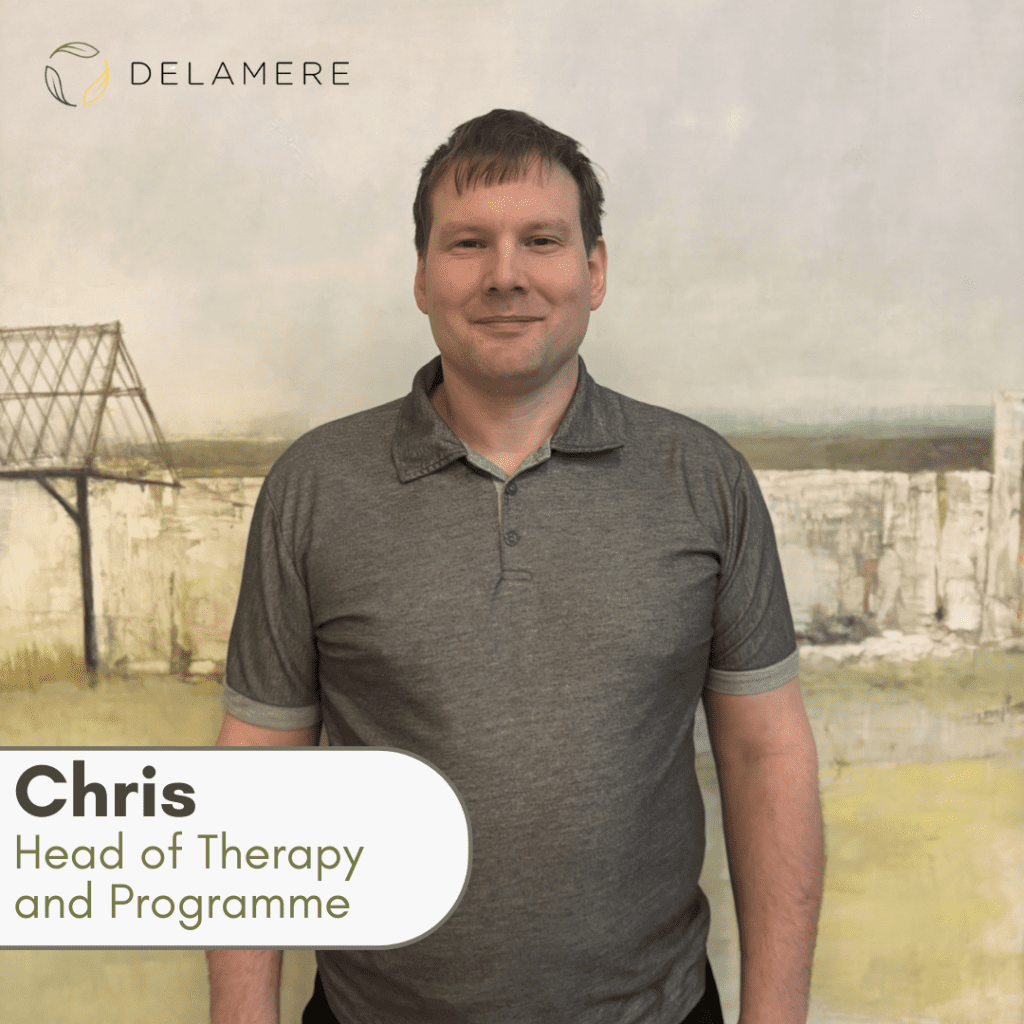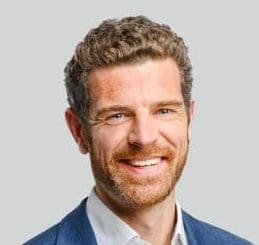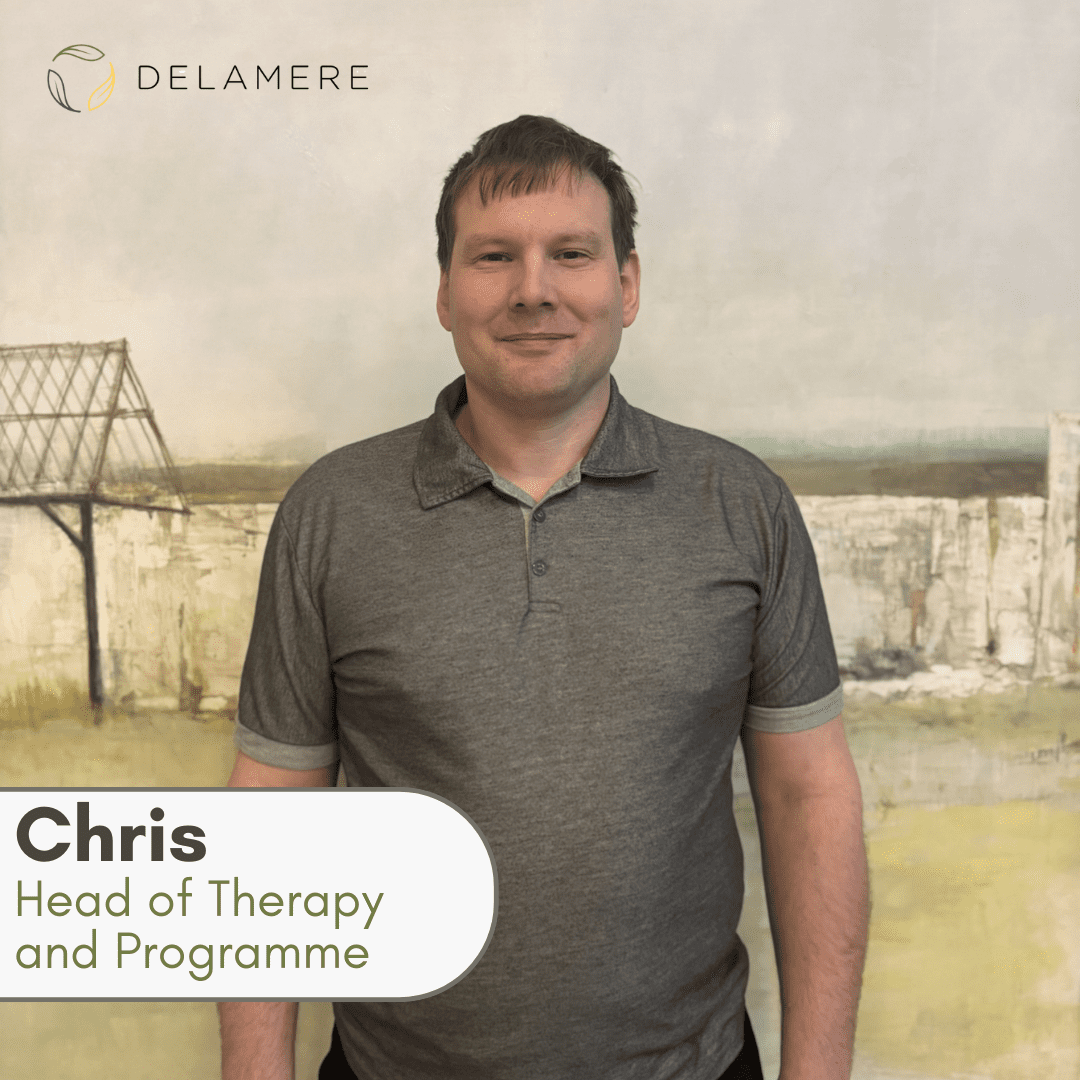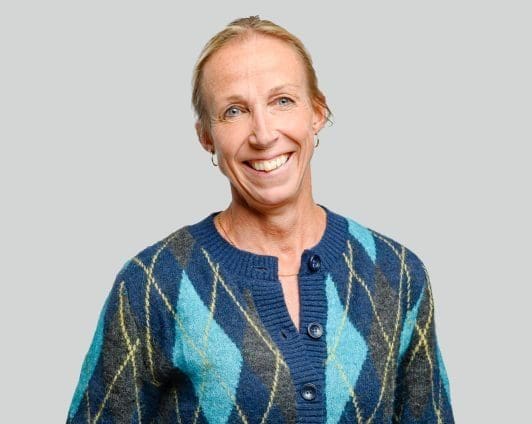What’s included?
- Introduction
- Background
- Why does working in addiction treatment appeal?
- What are your observations so far about the treatment model at Delamere?
- Can you tell us more about the Knowledge Transfer Partnership?
- You recently had some work published. Could you tell us more about that?
- Besides therapy we hear you’re pretty keen on wrestling. We’d love to hear more about that!
- The programme is described as ‘holistic’. What does that mean, or is it a buzzword?
We’re delighted to introduce Chris Lomas, Delamere’s Head of Therapy and Programme. Chris oversees the development, evolution, and delivery of The Delamere programme to ensure the highest standards of safety, quality, and outcomes for guests. In today’s Q&A we speak with Chris about his background in therapy and his remit here at Delamere.
As a qualified Psychotherapist and Psychologist Chris holds an array of accreditations, including postgraduate diplomas in Jungian Psychoanalysis, Clinical Hypnotherapy, Respiratory Psychophysiology, and CBT, alongside an MSc in Psychology. Chris is also certified in EMDR Level 4, Traumatic Stress through the Trauma Research Foundation and Neuro-Psychoanalysis.
A Fellow and accredited member of numerous professional organisations, Chris specialises in trauma, addiction, and the neurobiology of talking therapy. His published works contribute to advancing the field, with recent articles exploring rehabilitation outcomes, neurobiological interventions in addiction, and the application of the REFLECT framework to psychological services.

Talk us through your career background Chris
I came into Psychotherapy after meeting some very skilled practitioners, Jungian psychotherapists, close to 20 years ago now.
I already had a background in meditation through my involvement in Taoist and Tibetan Buddhist practices. They brought an awareness and clarity that was really helpful, so I trained with them to in Jungian Psychotherapy. I also went on to train in Clinical Hypnosis, Respiratory Psycho-physiology, Traumatic stress, CBT and EMDR. For the first decade I worked as a therapist mostly specialising in trauma, anxiety and addiction. Over time I began to take on more clinical development, quality and standards roles. It was a very natural progression.
At one point I realised I needed a bit more understanding of research methods and statistics so that I could ensure that I was adhering to best evidenced approaches, so I gained a MSc in Psychology from Derby University.
I progressed to being the Senior Therapist in services supporting large institutions like the British Rail, HMPPS, the Judiciary and the Cabinet office.
For the last few years prior to Delamere I worked with the University of Salford lecturing full time in the Counselling & Psychotherapy department, where I lead the MSc Advanced Counselling & Psychotherapy course.
Why does working in addiction treatment appeal?
Addiction and behavioural change are areas where we know talking therapies and experiential work has a profound positive impact – people working in these areas have the honour to see it every day.
However, the field often seems underserved when it comes to quality research and development. The chance to come to a sector leader like Delamere and build on the strong work already done, to develop and improve an already working process, and integrate cutting edge approaches is irresistible.

Call us confidentially at any time to speak to a member of our team.
Call us now: 0330 111 2015
What are your observations so far about the treatment model at Delamere?
Coming from a background in quality and standards, it is a rare treat to come to a service which already has a very strong programme. Most often I am called into services which are failing or require bringing up to standard. These services also often have a great resistance to the change necessary for improvement. However, at Delamere we have a model which is already working well – putting me in the enviable position of seeing how we can do even better.
The programme is described as ‘holistic’. What does that mean, or is it a buzzword?
It is certainly thrown around a lot and, I dare say sometimes, misused where I suspect what is meant is ‘unorthodox’. However true holism really situates itself in the idea that humans are complex and multilayered, each of us being much greater than the sum of our parts. Addiction disorders and unhelpful patterns of behaviour are similarly complex cutting across the biopsychosocial layers of the person.
This means treatment models must approach individuals as unique with their own personalised patterns of mal-adaption, requiring bespoke approaches across all those dimensions to bring the awareness required for lasting positive change.
For example, some guests may benefit from a more bottom-up approach, relaxing the body through yoga and breathwork, some through exploration and yet others through a more top-down cognitive restructuring approaches – and many from the right mixture of all of these given at the right times in their stay. Delamere’s programme, in that sense, is highly integrative and will continue to evolve to be more so.
Can you tell us more about the Knowledge Transfer Partnership that we hope to embark on with MMU?
Knowledge Transfer Partnerships are really exciting – they are collaborative initiatives connecting businesses with academic institutions to drive innovation and relevant research in the field. At Delamere we are in the process of partnering with Manchester Metropolitan University so that we can continue innovating, developing and evolving what best practice looks like.
You recently had some work published. Could you tell us more about that?
Certainly, over the last few months the Journal of Addictive Disease was good enough to publish a paper titled “Neurobiology, Psychotherapeutic Interventions, and Emerging Therapies in Addiction: A Systematic Review” which attempts to analyse the neurobiological underpinnings of addiction through evaluating various psychotherapeutic and emerging treatment modalities. It points to the necessity for integrated therapeutic approaches aligned to neurobiological and psychological aspects in both triage and treatment to support our guests and get the best results we can, alongside introducing an evidence-based framework.
The Alcoholism Treatment Quarterly kindly published another paper titled “A Thematic Analysis of British Rehabilitation Centers Clients Reviews” which presented a qualitative examination of client experiences within UK rehabilitation centres using thematic analysis. The study identifies key themes that reflect both positive and negative aspects of client experiences across the sector – the process of developing this paper gave me some really valuable insights for enhancing service quality in addiction treatment facilities and errors to avoid.
The Open Journal of Applied Sciences also published “A Mixed Methods Evaluation of the Application of the REFLECT Framework to Psychological Services” where I reviewed the outcomes for the REFLECT Psychological Services Audit Framework which I developed to address what I believe to be critical gaps in the evaluation of Mental Health services. These findings, based on my applying the system to a number of psychological services over the year, suggest the REFLECT framework offers a valuable for improving service quality, financial efficiency, and clinician support in psychological services. I hope my learning in the development of this framework will be beneficial to Delamere.
Besides therapy we hear you’re pretty keen on wrestling. We’d love to hear more about that!
Yes, my twin passions are Chinese Martial arts and the old form of Lancashire wrestling – Catch-as-Catch-Can or Catch Wrestling. I’m feeling a little past competition nowadays, although I was 40 when I won the world championship which I kept until 45, but training a few times a week gives me a great way to destress. Wrestling has often been likened to physical chess and you have to be 100% focussed otherwise you’ll quickly know about it. People often say wrestling is the oldest sport but they are wrong, it predates humans. Work by Jaak Panksepp demonstrates that even rats play by wrestling to the pin. It’s a great way to learn about yourself and your interactions with others.
Chris’s recent publications include:
A Thematic Analysis of British Rehabilitation Centers Clients Reviews 2020–2024
A Mixed Methods Evaluation of the Application of the REFLECT Framework to Psychological Services
You can follow Chris on LinkedIn here

Call us confidentially at any time to speak to a member of our team.
Call us now: 0330 111 2015








